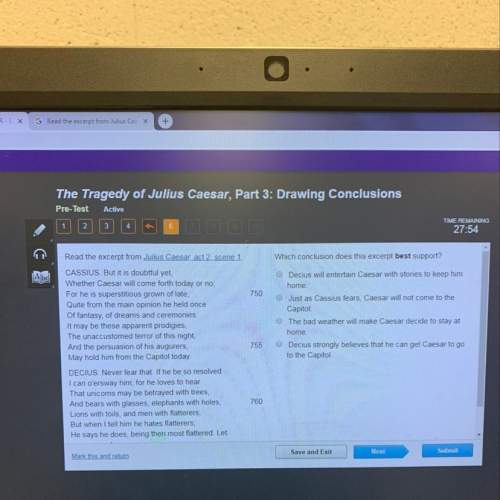Part A: Read the excerpt from the text. "That is no vision of a distant millennium.
It is a de...

English, 16.03.2020 20:12 gottapass62
Part A: Read the excerpt from the text. "That is no vision of a distant millennium.
It is a definite basis for a kind of world attainable in our own time and generation.
That kind of world is the very antithesis of the so-called new order of tyranny
which the dictators seek to create with the crash of a bomb." How does this
paragraph add to the development of the text?*
O
The author is highlighting his objection to ruling without democracy
The author is acknowledging that the American people are reluctant to get involved in
another world conflict.
O
The author is providing support for his vision of world peace and democracy.
O
The author is responding to critics who say his policies are unattainable.

Answers: 2


Another question on English

English, 22.06.2019 01:00
Read the passage first of all if someone says your dream is impossible, they’re wrong. you can’t prove that something is impossible-all you know is that[it] hasn’t been done yet. people said no one could scale mount everest but in 1953, sir edmund hilary and tenzing norway gazed down upon the world from it’s summit. people said that man could not fly, but in 1903, orville and wilbur wright made the first sustained powered flight in a heavier-than-air machine. people said, “okay, we admit that someone could climb mount everest, and we admit that man has learned to fly, but no one will ever, ever walk on the face of the moon.” if we can send three men a quarter of a million miles away and bring them home safely, is there any great task we cannot accomplish? which identifies the textual evidence that best supports the claim: the authors purpose is to persuade? a: the author shares historical information about the wright brothers. b: the author states that men have walked the moon. c: the author states that others who think your dreams are impossible are wrong. d: the author wants to know what tasks we cannot accomplish.
Answers: 1

English, 22.06.2019 02:40
Julius caesar. [brutus.] with this, she fell distraught, and, her attendants absent, swallowed fire. cassius. and died so? brutus. even so. cassius. o ye immortal gods! [enter lucius, with wine and taper] brutus. speak no more of her. give me a bowl of wine. in this i bury all unkindness, cassius. cassius. my heart is thirsty for that noble pledge. fill, lucius, till the wine o'erswell the cup; i cannot drink too much of brutus' love. [exit lucius. enter titinius, with messala] brutus. come in, titinius; welcome, good messala. now sit we close about this taper here, and call in question our necessities. cassius. portia, art thou gone? brutus. no more, i pray you. what moral dilemma does brutus confront in this excerpt? brutus lets go of his anger toward cassius and forgives him. brutus decides that he will not mourn portia and will stay loyal to cassius. brutus decides that he is too angry at cassius to remain friends with him. brutus questions whether cassius's life should be ended.
Answers: 3

English, 22.06.2019 04:30
Compare and contrast the merits and drawbacks of at least two of the scholarly approaches to literature described in this unit. be sure to mention at least one advantage that each approach has over the other. use one of the readings from this unit in your comparison. your answer should be at least 250 words.
Answers: 1

English, 22.06.2019 06:30
Use a pronoun to refer to two or more singular antecedents joined by or or not
Answers: 1
You know the right answer?
Questions

Mathematics, 20.01.2021 21:40

Mathematics, 20.01.2021 21:40


Arts, 20.01.2021 21:40


Chemistry, 20.01.2021 21:40

Mathematics, 20.01.2021 21:40

Health, 20.01.2021 21:40

Mathematics, 20.01.2021 21:40


History, 20.01.2021 21:40



Mathematics, 20.01.2021 21:40




Mathematics, 20.01.2021 21:40

Arts, 20.01.2021 21:40

German, 20.01.2021 21:40




